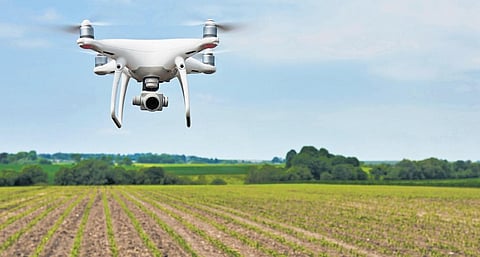

CHENNAI: Farm drones adoption is expected to pick up significantly from 2024 as the tech ecosystem surrounding it matures, favorable policy environment and surge in demand from various quarters, including corporate farming.
Ramanathan Narayanan, co-founder and chief executive of Daksha Unmanned Systems, a Chennai-based drone start-up, said demand for the agri drones is going up from thousands to five lakh in the next few years. He said they’re ramping up production facility and establishing a new facility with a capacity to 12,000 drones a year to meet the demand. He stressed the importance of increasing skilled pilots in the farm sector to about 3,000 at present to 2 lakh in the next two years.
Narayanan said opportunities in corporate farming are big and currently Indian players are exploring the huge potential in agri drone exports. “The adoption of nano-fertilizers, which cannot be sprayed manually, increases the scope for drones,” he added.
Coromandel International, an agriculture input focused company from Murugappa group, has picked up a majority stake in Daksha. Agricultural drones are used in wide-ranging applications including spraying pesticides, fertilizers, crop monitoring, yield estimation among other things.
Business models
Since drones are not affordable for majority of small and marginal farmers, the drone-as-as service model of leasing just like tractors is evolving. This is offered by third-party players and by the OEMs in some cases. It is sold through dealers, distributors, FPOs, FPCs (farmer producer company), and village entrepreneurs.
Limitation of battery capacity, lack of financing models or difficulties in obtaining subsidies for drones pose challenges for farmers, said R Subash Naidu, a farm union leader in Tamil Nadu. “Despite, announcement of the subsidies, it needs to be seen on the ground,” he said. Farmers and drone enthusiasts agree that shortage of labour, need to avoid exposure to fertilizers and chemicals to humans all suggest drone penetration is set to rise.
Ramanathan Narayanan said the cost of renting became lower than manual spraying and estimated about 30% reduction in fertilizer usage. Calling it ‘third-wave of agriculture revolution’, the Union government is taking efforts to increase awareness about drones in the farming sector with demonstrations and outreach programs. Incentives like subsidies of up to `5 lakh for small and marginal farmers, providing drone pilot training, providing 15,000 drones to selected women self-help group for rental services to farmers.
Prem Kumar, chief executive of Marut Drones, a Hyderabad-based start-up, said the Center’s nod for pilot training in regional languages, instead of only English as instruction language is a major step in providing training in rural areas. He said liberalisation of pilot training programmes will boost skilling in rural areas. Prem Kumar too asserts that the demand for drones is one the rise, but acknowledges that difficulties persist in getting loans or subsidies.